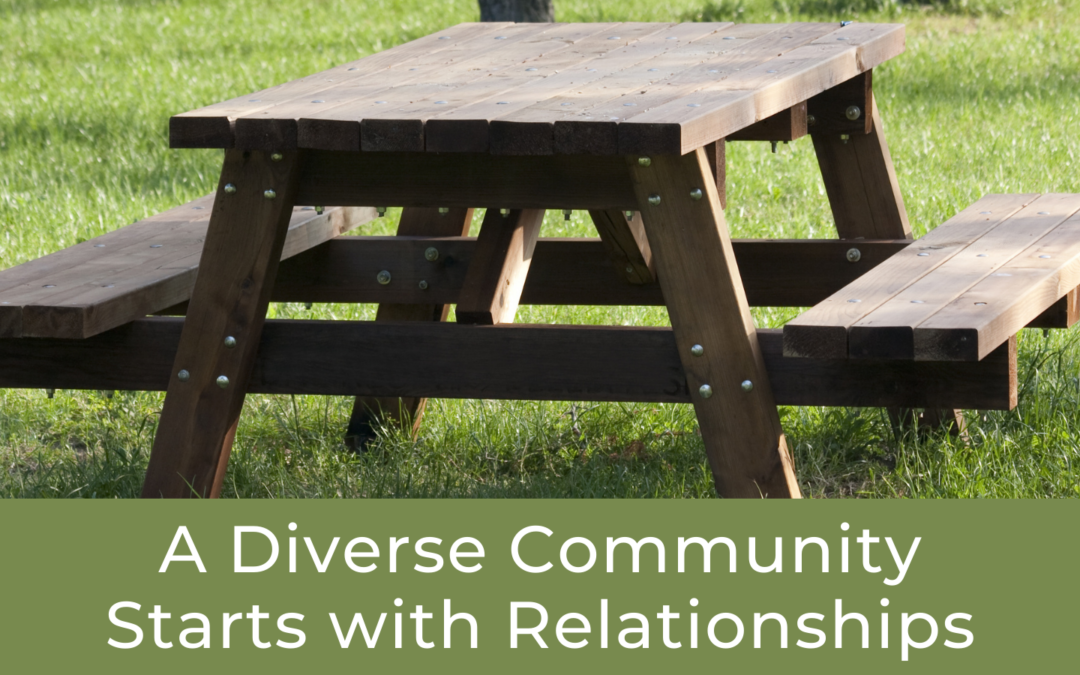I am honored to share his thoughts with you below. I’m also grateful that our students are mentored by Mr. Vaughan and other NCS teachers who equip them to be Ambassadors for Christ!

A Diverse Community Starts with Relationships
by Kevin Vaughan
This year marks 31 years since I graduated college. Back then, I was a relatively new believer, raw with enthusiasm and passionate about the Lord and the Bible. It explains why I forsook my career path in engineering to pursue my love for the Bible at a Bible college. I remember those days of being blown away by the truths of Scripture and captivated by the wealth of knowledge that my professors possessed. I thought, “Man, they’ve spent a lot of time with the Lord.” One professor never came to class with notes. He would show up and just start oozing Old Testament theology and pontificating words in Hebrew. I felt like a ground-level apprentice.
What I didn’t anticipate was the different cultural context in which the Bible was taught and my everyday life experiences played out. I mean, I knew I was going to be attending a predominantly white college but it was just a factual reality. That is until I had to live in the dorms and sit at desks alongside people who didn’t look like me. My city, Plainfield, New Jersey, was predominantly black. Aside from the teachers (and one friend and a crossing guard), my world was saturated with a multiplicity of shades of brown, even albino. My religious context was no different. There was a particular sound for worship. There was a particular style of preaching.
This was a dramatic change in college. Being a minority was a distant truth that never intruded home but quickly it became a close and personal, lived experience. Dr. Beverly Daniel Tatum’s best-seller Why Are All the Black Kids Sitting Together in the Cafeteria? (2017) was a reality for which I could’ve provided commentary. The black table in the cafeteria was a mini oasis for me. Though no one was from Plainfield, everybody was from Plainfield. There was an instant connection of sorts centered around the obvious racial identity and shared experiences of life in a white space.
The “black table” wasn’t exclusive. Others were welcome to sit and dine but it was according to our cultural terms. There were occasional “others” who would dine with us. One, in particular, made me suspicious. She seemed a bit too comfortable, like she was used to being around people who looked different than her. Come to find out she was indeed comfortable. She was from Philadelphia. She attended The Philadelphia School of Creative and Performing Arts which was very diverse. The awkward conversations didn’t happen with her. The curiosity over hairstyles, do-rags, Ebonics, and the like wasn’t there. At this point in her life, she had had a myriad of experiences that afforded her the confidence to be herself and appreciate others.
Over the course of a few years, we developed a pretty good friendship. That’s an understatement. Actually, our seven years of friendship culminated in marriage in 1998! This August 15th, Heidi and I will celebrate 24 years of marriage. Whether directly or indirectly, intentionally or not, we have had to confront ideologies regarding race. This season of life has brought us to a renewed desire to see our “mixed marriage” as an asset and testimony of God’s power to unite two people from two different cultures and ethnicities and create a family that seeks to put the Lord first.
As one who has spent over 30 years in white spaces, I am convinced that the Church can be a lighthouse for how to live, function, and thrive in relationships with those who are different from us. Here are some helpful suggestions for developing those relationships.
- Recognize that we have the power and love to engage in relationships that span differences. One of the lies that our enemy perpetuates is, “I can’t speak on race because I don’t want to say the wrong thing.” This is a real concern. We must examine the number of experiences we have had with people who are not like us. If our world – work, social life, church – is filled with people who look and think like us, it will be a challenge. Our first responsibility in these relationships is to be quick to listen [James 1:19]. However, as we intentionally and persistently engage in relationships, we have the opportunity to develop deeper levels of trust. “For the Spirit God gave us does not make us timid, but gives us power, love, and self-discipline.” [2 Timothy 1:7]
- Rely on the Spirit of God to guide us in these relationships. Spirit-led relationships are genuine, pure, and holy. However, they are not void of conflict and misunderstandings. We must come to a place of desperation. Jesus stated in John 15:5 “apart from Me, you can do nothing.” The posture of our hearts and our prayers must be “apart from you, Jesus, we can’t develop genuine, pure, and holy relationships with those who are different from us.” “But if Christ is in you, then even though your body is subject to death because of sin, the Spirit gives life because of righteousness. And if the Spirit of him who raised Jesus from the dead is living in you, he who raised Christ from the dead will also give life to your mortal bodies because of his Spirit who lives in you.” [Romans 8:10-11]
- Refuse to allow comfort to reign over our relationships. We have to ask ourselves, “Are we willing to lay down our lives for our brothers and sisters who are not like us?” If the answer is yes, what would that look like? I believe this requires relinquishing the unspoken standards of what we consider to be normal, the preferences that rule our ‘how-tos’: how we worship, how we speak to one another, how we show emotion, how we view time, how we view recreation, and so much more. When we acknowledge that there are many ways to express our ‘how-tos’ then we can become curious about the ‘how-tos’ of others. Are we willing to be uncomfortable in order to pursue these relationships? “This is how we know what love is: Jesus Christ laid down his life for us. And we ought to lay down our lives for our brothers and sisters.” [1 John 3:16]
- Refuse to let fear sabotage the joys of having relationships with others who are not like us. “There is no fear in love. But perfect love drives out fear, because fear has to do with punishment. The one who fears is not made perfect in love.” [1 John 4:18]
The nationally recognized events of 2020 and 2021 revealed that our array of perspectives on race, specifically in the body of Christ, has been underdeveloped, often avoided, and/or rarely examined. However, the hope of our glorious Gospel provides us with the desire, the power, and the means to reflect the heart of Christ to all tribes, nations, languages, and people.


